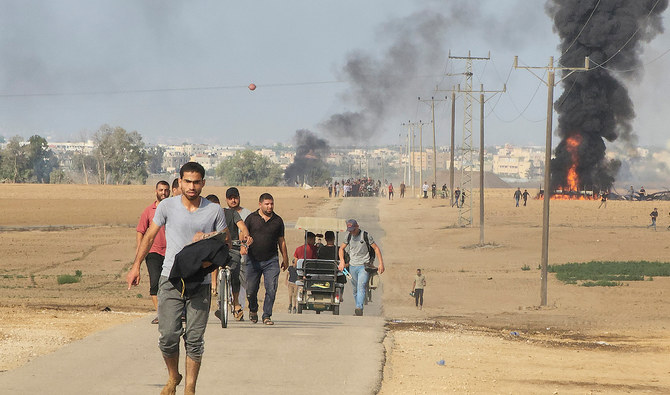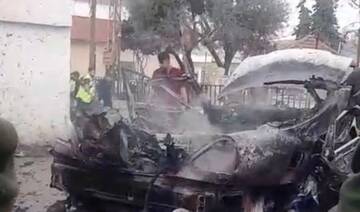JERUSALEM: Israeli Prime Minister Benjamin Netanyahu has told Israel that it is “at war” with Hamas militants that rule the Gaza Strip.
Netanyahu’s comments in a televised address mark his first since the Gaza Strip’s Hamas rulers launched a major, multi-front attack on Israel at daybreak Saturday. He ordered a call-up of reservists and promised that Hamas would “pay a price that it hasn’t known until now.”
“We are at war,” Netanyahu said. “Not an ‘operation,’ not a ‘round,’ but at war.”
The prime minister also ordered the military to clear the infiltrated towns of Hamas militants that remained locked in gunfights with Israeli soldiers.
Hamas on Saturday fired thousands of rockets at Israel and sent dozens of fighters across the country’s heavily fortified border, a massive show of force that caught Israel off-guard on a major holiday.
Political commentators lambasted the government over its failure to anticipate what appeared to be a Hamas attack unseen in its level of planning and coordination.
The Israeli rescue service said that its medics were tending to 16 casualties in southern Israel, including a woman in her 60s who was killed when a rocket fired from Gaza made a direct hit, and two people in serious condition.
There were reports of many more casualties on both sides, but authorities did not immediately release details. Israeli media reported that dozens of people were hospitalized in southern Israel. The Palestinian Health Ministry in Gaza reported injuries among “many citizens” without giving numbers and loudspeakers on mosques broadcast prayers of mourning for killed militants.
The Israeli military struck targets in Gaza in response for over 2,000 rockets that sent air raid sirens wailing constantly as far north as Tel Aviv and Jerusalem. It said its forces were engaged in gunfights with Hamas militants who had infiltrated Israel in at least seven locations. The fighters had sneaked across the separation fence and even invaded Israel through the air with paragliders, the army said.
It was not immediately clear what prompted Hamas to launch its attack, which came after weeks of simmering tensions along the Gaza frontier. The shadowy leader of Hamas’ military wing, Mohammed Deif, announced the start of what he called “Operation Al-Aqsa Storm.”
“Enough is enough,” he said in the recorded message, as he called on Palestinians from east Jerusalem to northern Israel to join the fight. “Today the people are regaining their revolution.”
In a televised address, Israeli Defense Minister Yoav Gallant warned that Hamas had made “a grave mistake” and promised that “the state of Israel will win this war.”
The attack comes at a time of historic division within Israel over Netanyahu’s proposal to overhaul the judiciary. Mass protests over the plan have sent hundreds thousands of Israeli demonstrators into the streets and prompted hundreds military reservists to avoid volunteer duty — turmoil that has raised fears over the military’s battlefield readiness.
Videos posted on social media showed what appeared to be the lifeless body of an Israeli soldier being trampled by an angry crowd of Palestinians shouting “God is Great.” Other footage appeared to show Palestinian militants dragging away an Israeli soldier, still alive, on a motorcycle and Palestinian men dancing atop a stolen Israeli tank that had been set ablaze. The authenticity of the videos could not immediately be verified.
“We are in a state of war,” said Kobi Shabtai, the Israeli police chief. “There is no other explanation.”
The infiltration of fighters into southern Israel marked a major accomplishment — and escalation — by Hamas. Millions of people were hunkering down in safe rooms, sheltering from rocket explosions and ongoing gunbattles with Hamas fighters. Cities and towns emptied as the military closed roads near Gaza. The army ordered residents near the Palestinian enclave to stay inside. Israel’s rescue service appealed to the public to donate blood.
“We understand that this is something big,” said Lt. Col. Richard Hecht, an Israeli army spokesperson. He said the Israeli military had called up the army reserves.
Hect declined to comment on how Hamas had managed to catch the army off guard. “That’s a good question,” he said.
Salah Arouri, an exiled Hamas leader, said the operation was a response “to the crimes of the occupation.” He said fighters were defending the Al-Aqsa Mosque in Jerusalem and the thousands of Palestinian prisoners held by Israel.
Palestinian President Mahmoud Abbas said on Saturday that the Palestinian people have the right to defend themselves against the “terror of settlers and occupation troops”, the official news agency WAFA quoted him as saying.
He spoke at an emergency meeting held in Ramallah with a number of top officials from the Palestinian Authority.
Israel has built a massive fence along the Gaza border meant to prevent infiltrations. It goes deep underground and is equipped with cameras, high-tech sensors and sensitive listening technology.
The escalation comes after weeks of heightened tensions along Israel’s volatile border with Gaza, and heavy fighting in the Israeli-occupied West Bank. It also comes at a delicate time for Netanyahu’s far-right government, with hundreds of soldiers in the military reserves have either pulling out of training sessions or promising they won’t report for duty over government’s deeply divisive plan to weaken the Supreme Court.
The divisions within army ranks have threatened to undermine Netanyahu’s reputation as a security expert who would do anything to protect Israel and the cohesion of an institution crucial to the stability of a country locked in low-intensity conflicts on multiple fronts and facing threats from Lebanon’s Hezbollah militant group.
Hezbollah congratulated Hamas on Friday, praising the attack as a response to “Israeli crimes” and saying the militants had “divine backing.” The group said its command in Lebanon was in contact with Hamas about the operation.
Israel has maintained a blockade over Gaza since Hamas seized control of the territory in 2007. The bitter enemies have fought four wars since then. There have also been numerous rounds of smaller fighting between Israel and Hamas and other smaller militant groups based in Gaza.
The blockade, which restricts the movement of people and goods in and out of Gaza, has devastated the territory’s economy. Israel says the blockade is needed to keep militant groups from building up their arsenals. The Palestinians say the closure amounts to collective punishment.
The rocket fire comes during a period of heavy fighting in the West Bank, where nearly 200 Palestinians have been killed in Israeli military raids this year. In the volatile northern West Bank, scores of militants and residents poured into the streets in celebration at the news of the rocket barrages.
Israel says the raids are aimed at militants, but stone-throwing protesters and people uninvolved in the violence have also been killed. Palestinian attacks on Israeli targets have killed over 30 people.
The tensions have also spread to Gaza, where Hamas-linked activists held violent demonstrations along the Israeli border in recent weeks. Those demonstrations were halted in late September after international mediation.













